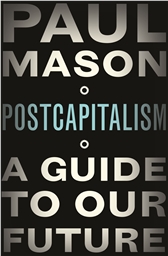For the past 15 years I have given a lecture during the first module of our masters course on sustainable development on the evolution of the global economy from about 1850 onwards and how this relates to the history of economic theory as we have moved through different paradigms. At the end of this 4 hour lecture I am often asked for a reference to a book that covers the same ground in a similar way. I usually vaguely refer to Tony Judt or Castells or some others, but none of these really cover the material as I do this lecture. I think I have finally come across a text that does the trick (albeit written from a global North perspective), and this is the book by Paul Mason entitled Postcapitalism: A guide to our future. I will in future be recommending this really useful book. I’ll be drawing heavily from this text for the course on alternative economics that I am teaching this coming week which I am determined to keep focused on alternatives rather than remain in the comfort zone of critique. No-one disagrees that we face a crisis – there is not much point belabouring the point. What we lack is imaginative ways of thinking beyond the crisis. As Frederic Jameson put it: ‘It seems easier for us today to imagine the thoroughgoing deterioration of the earth and of nature than the breakdown of late capitalism’ (http://newleftreview.org/II/21/fredricjameson-future-city). So what lies beyond the current polycrisis given that we are living in the information age (Castells), governed by neo-liberal economics which may be intellectually bankrupt but remains powerful because of its profound reductionism, and we are experiencing a crisis of what it means to be human (following the posthumanist turn, or new materialism – Rosi Braidotti etc) in the Anthropocent at a time when most of us now live in cities.
Recent Posts
Recent Comments
- salim on Can economic policy escape state capture?
- Salim on Reflections on Experimentation, Futuring and Incrementalism, with special reference to the African context
- Political obstacles to a mass renewable energy programme - Mark Swilling on Global trends, SA context – the centrality of the global renewable energy revolution
- Carola Meyer on Renewables, oil peak and the crisis of banking
- Muntu Dosi on Weight of Cities, Experimentation and Transdisciplinarity


Mark Link not working http://newleftreview.org/II/21/fredricjameson-future-city
Creating Shared value (Micheal Porter) is the most sensible theory I have come accross. He also has good ideas on the development of Multi-Sided Platforms. How does one include all of that into a circular economy of scale without a revolution or two? Hopefully the book proposed has all the answers, because we are running out of time.
Mark, thought you might find this astrological analysis of long wave interesting http://www.astro.com/astrology/in_kondratiev_e.htm. I didn’t include this in my thesis as I opted to write up the theoretical aspects which I am now trying to bridge into IDP, SDF, IUDF, SPLUMA, etc.
Great. Please investigate the p2pfoundation and the lectures and work of Michel Bauwens Prof. Mark Swilling – these are all focused on the constructive alternatives.
Mattieu Theron
Ranen Swilling #VintageMark